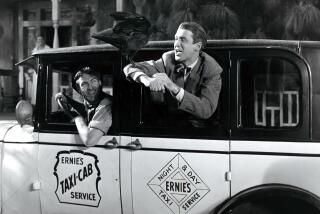Company Town : Yule With Less ‘Wonderful Life’? Tune In
- Share via
In Frank Capra’s 1946 Christmas classic, “It’s a Wonderful Life,” George Bailey gets to see what life would have been like without him.
Over the next month, you’ll get to see what a holiday season is like without “It’s a Wonderful Life” airing nonstop on television.
Avoiding “It’s a Wonderful Life” during Christmases past has been as difficult as avoiding Zapruder’s Kennedy assassination film over the last two weeks. Virtually every local television station or cable channel aired the Capra classic, often simultaneously, believing they could do so without paying royalties because the movie was in the public domain.
Turns out that wasn’t the case. Bolstered by a U.S. Supreme Court decision, lawyers are now succeeding at doing what the film’s evil Mr. Potter always wished he could do: rein in the Baileys. For the first time since Jimmy Carter’s presidency, there will be no more Bailey-a-thons with George and Mary dancing the Charleston on one channel while Mr. Gower is slapping George’s bad ear on another.
The film itself is an endearing story in which George, played by James Stewart, longs to get out of the fictional town of Bedford Falls, N.Y., and see the world, but never does. After his Uncle Billy misplaces $8,000 from the Baileys’ building and loan association, George considers suicide. He is deterred by a guardian angel, Clarence Oddbody, who shows George how awful life would have been had he not been born.
Capra’s film performed sluggishly at the box office. It got five Academy Award nominations but didn’t win one. The film owes most of its popularity to a mid-1970s clerical error by then-owner NTA that allowed the copyright to lapse. “It’s a Wonderful Life” was then assumed to be in the public domain and fair game for anyone who wanted to air it, colorize it or hack off some of its original 137 minutes to squeeze in a few more commercials.
With its nonstop airings during the Christmas season, “It’s a Wonderful Life” developed a growing following. It was said to be the favorite movie of Steven J. Ross, the late Time Warner chairman who, as he lay dying of cancer, was registered in a Los Angeles hospital under the alias “George Bailey.”
*
It also became a favorite Christmas film of baby boomers who discovered it in the 1980s. The production company that made the quintessential baby-boomer series “thirtysomething” was named after George Bailey’s home town of Bedford Falls.
“It’s a Wonderful Life” stopped being freely available for broadcast as the result of a Supreme Court decision in 1990 upholding the rights of the owner of a short story on which Alfred Hitchcock based his “Rear Window” thriller. That caused Republic Pictures, which had assumed “It’s a Wonderful Life” was in the public domain, to look closely at the rights it held to “The Greatest Gift,” an obscure short story by Philip Van Doren Stern on which Capra loosely based his film.
*
Realizing that it was losing millions, Republic quietly set out to buy rights to the music used in the film. That gave Republic “two barrels of a shotgun” in its legal defense, says lawyer James Tierney, who represents Republic. Republic also owned the original negative.
Last summer, Republic began serving notice of its copyright claim to broadcast stations, cable channels and video chains, including the company that controls it, video giant Blockbuster Entertainment.
Republic Chairman Russell Goldsmith says he now wants to eliminate for good all colorized versions and bootleg and poor-quality copies of the film. He also yearns to make showings of “It’s a Wonderful Life” rare enough so that major networks will be eager to air the film during the holidays and make a big deal out of it. He also wants to eventually re-release the film theatrically. All this for a film already on videocassette in millions of homes and once sold at Blockbuster for only $4.95.
Although it won’t air as often, “It’s a Wonderful Life” will be on a few times this season. Republic is allowing a few channels and stations to air the film because they already had plans in place, and Republic doesn’t want to anger some of the people it regularly does business with. “We’re trying to resolve this without filing 200 lawsuits. We would win all of them, but we’re trying to do this amicably first,” Tierney says.
*
A Loud Quack: Some candid comments by Ron Wilson, coach of Walt Disney Co.’s new Mighty Ducks of Anaheim hockey team, in a recent Hartford Courant interview suggest it may take time to get the hang of Team Disney.
Said Wilson: “Because we’re involved with a lot of people in the entertainment business, they treat the hockey players as objects, not real human beings. The first week of training camp, it was like a circus in our locker room. People were just walking through.
“They’d bring in clients, right in the middle of a meeting. Walk in and just walk right through--’These are our dressing rooms, these are our players’--like we’re objects.
“No one has any real feel or idea how intense these guys have to be in order to work. Every day there’s little things that happen and we’ve got to straighten some people out, a lot of the sideshow-type things. They wanted to have the cheerleaders on the ice high-fiving the players when we skate out. It’s a different experience.”
More to Read
Only good movies
Get the Indie Focus newsletter, Mark Olsen's weekly guide to the world of cinema.
You may occasionally receive promotional content from the Los Angeles Times.










